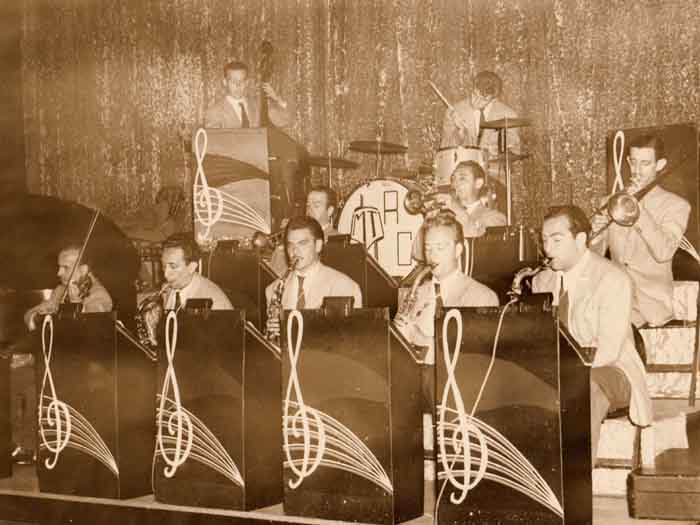
By Thelma Johnston Loika
The rabbi who helped Virgil waited patiently and took him to a Jewish orphanage somewhere on the East Side of Manhattan. For several days, efforts to locate the uncle in Detroit came to no avail. And so Virgil attended classes and was given a trombone to play with the school band.
His stay at the orphanage did not last long. Virgil was farmed out from time to time to Jewish families who needed household help. However, these numerous reprieves from orphanage life lasted for few short months whereupon he would be returned to the orphanage where discipline was harsh.
Virgil lived with such a typical family in Rochester, NY, when he graduated from high school. A traveling circus played there, and he played with its band. When the circus left town, Virgil and his trombone went with them.
His vagabond departure seems to have been another running-away event. But during that last year of high school, it seems he took some classes at Eastman School of Music.
The circus played in various towns around the country all summer long. When September came, he found himself in Dallas. Having saved some money, he enrolled at Southern Methodist University (SMU), but his savings soon ran out.
Virgil had not finished his first semester when he ensconced himself with a traveling band that had come to town somewhere around 1925-26. He was hired by this band and traveled around for several months before winding up in Philadelphia a year later.
That’s where Virgil met Horace Gerlach, whose home was in Philadelphia. The two became close friends while attending Curtis Institute of Music for some time. Horace played piano and composed popular music. However, Virgil remembered him as the only son of a doting mother, a relationship that suffered some unhappy twists while they lived together.
Virgil joined various jazz groups and became active with several bands in and out of New York City, where he met and worked with Bill Mayer, a trumpeter who also became a close friend. Musicians had a reputation as “lushes”; fortunately, Virgil had too sensitive a palate to imbibe cheap whiskey. Also, he was disinclined to join the drug scene (although he told me he’d seen some musicians just walk off a roof into oblivion).
He played nightclubs run by gangsters, but escaped their attention or involvement, never running afoul of either side of the law. Music itself seemed to be his whole focus. He joined bands that played Palm Beach and Boca Raton. He played with orchestras that performed Broadway musicals as well as operas – very versatile! Virgil made money and invested in the stock market, losing a bunch in the 1929 Stock Market Crash.
Over the next 10 years, Virgil continued playing clubs with traveling bands, maintaining his friendship with Bill Mayer. Apparently, they were in Chicago together when Mayer met a musician named Jerry. Those two developed a live-in relationship that lasted into the 1950s.
Sometime also in the 1930s, Virgil was diagnosed with tuberculosis and was sent off to be interned with like patients at the state-run facility in upper New York. I don’t know how long he stayed there. I do know he was never formally released, but rather just left on his own, returning to New York City where he became a patient of Dr. Kastenbaum, who gave Virgil frequent checkups and surveillance.
How did I meet Virgil? Well, I was staying at Mrs. Strode’s “Cacophony House,” 100 W. 78th St. (if I remember the address right). Almost every room had a piano; however, in was understood that Mrs. Strode had a license to move her roomers as circumstances required.
One morning, I came home from work at Western Electric to find she’d moved me and my belongings into one room of her own apartment, which had no piano. But she assured me that a tenant on the floor above us was occupied by a musician who was gone all day. I was free to use his piano since I worked the graveyard shift.
Virgil was handsome with dark eyes, and would not give his consent until after a rehearsal trial. I visited obediently at the appointed hour and performed “Liebistraum,” upon which he granted conditional approval.
It turned out that each night Virgil shopped and cooked a nightly dinner for those on his floor who chipped in. Discovering his considerable culinary skills, I readily chipped in.
Soon Virgil began pursuing me, and in Central Park, across from our living quarters, he proposed. I was sorely tempted, because I felt severely, harshly alone. There had been times while walking home when I arrived at Columbus Circle and thought, “Why don’t I step into traffic? No one will miss me.”
But when Virgil proposed, he didn’t kneel or make romantic offerings. Instead, he began a straightforward discussion of pragmatic economic advantages for our permanent liaison. His offer dashed aside my hopes, feelings, whatever a bride-to-be could have wanted.
I told him I would think about it. But as I slept that night, I tossed and turned, wondering what choice did I have?
[CONTINUED ON PART III]
I have confirmed Virgil’s enrollment at SMU for the 1930-1931 academic term.